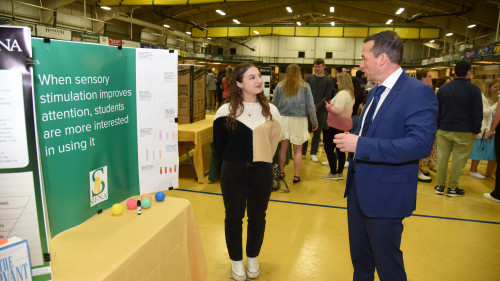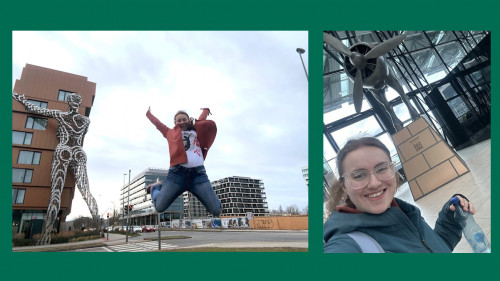
By Mike Clemens '15
Author and journalist Douglas Blackmon delivered Siena’s 27th annual Martin Luther King Jr. and Coretta Scott King Lecture on Race and Nonviolent Social Change to a packed house on April 3 in the Alumni Recreation Center on campus.
Blackmon’s address, titled “Civil Rights and the Continuing Impact of Slavery in the 21st Century” spoke to the ongoing racial struggle in America today and related his own research to the mission of Siena’s MLK Lecture.
Blackmon is the 2009 recipient of the Pulitzer Prize for General Nonfiction for his book “Slavery by Another Name: The Re-Enslavement of Black Americans from the Civil War to WWII.” The book has also been adapted into an award-winning PBS film, on which Blackmon served as executive producer.
“When we look for keynote speakers, we are looking for someone who has had a national impact and for someone who is already making a difference,” said Peter Ellard Ph.D, associate vice president for Academic Affairs for Student Retention and Success. Ellard is also Chair of the MLK Lecture Advisory Board. “Douglas Blackmon is certainly making a difference.”
In his address Blackmon asked the audience of students, faculty and staff to look at American history through a different, darker lens.
“People often ask me why we should want to dredge up such painful parts of our history,” Blackmon said. “But to make any progress on the issues of inequality that affect all of us today, we have to understand – and be honest about – how things came to be the way they are.”
Blackmon’s research focuses on a system of enslavement that persisted in parts of the South after the end of the Civil War and well into the 20th century. This practice – which Blackmon calls “neo-slavery” – was precipitated by a corrupt judicial system and profoundly racist laws that Blackmon described as “the ultimate Catch 22.” Under this system, free African American men were incarcerated at alarming rates and sentenced to hard labor as punishment for trivial offences. Many of these individuals were worked to death and their suffering went unrecorded and unimpeded by the federal government until Teddy Roosevelt’s assent to the presidency in 1910.
“These are the kinds of hard truths that Americans of every ethnic or social background need to understand for progress to be made in our society's disparities,” Blackmon said. “And we need to understand them to make sure similar things and new disparities don’t develop for other groups of people today.”
“The MLK Lecture is an excellent opportunity for Siena students to see, to hear, and to meet some world-class individuals. Mr. Blackmon is no exception,” said Paul Murray, Ph.D., professor of sociology. “Educating future generations is really the best way that we can carry on the message of social justice and social change begun by Dr. King.”
Blackmon concluded his address by challenging the audience to do their part to eliminate inequality in their communities.
“The only way for his (MLK’s) work and vision to be fulfilled is for the students and faculty of a place like Siena to keep talking, keep pushing, keep asking why some things change so slowly, and making sure the most important issues are in front of everyone,” Blackmon said. “To make a change we first have to take a risk. Speak up. And listen to the people who disagree. It may seem awkward at first, but in my experience, only good ever comes in the end. And then the work begins.”



